AI Research Scientists are the pioneers of innovation in the field of artificial intelligence. They explore the complexities of machine learning, deep learning, and neural networks to create models that can understand and predict human behavior.
Skills required for an AI Research Scientist include a strong foundation in mathematics, programming skills in languages like Python, and expertise in data analysis. These professionals must also have strong analytical thinking and problem-solving skills to develop cutting-edge AI models.
Candidates can write these abilities in their resumes, but you can’t verify them without on-the-job AI Research Scientist skill tests.
In this post, we will explore 7 essential AI Research Scientist skills, 8 secondary skills and how to assess them so you can make informed hiring decisions.
Table of contents
7 fundamental AI Research Scientist skills and traits
The best skills for AI Research Scientists include Machine Learning, Statistical Analysis, Programming Proficiency, Data Preprocessing, Deep Learning, Mathematical Aptitude and Domain Knowledge.
Let’s dive into the details by examining the 7 essential skills of a AI Research Scientist.
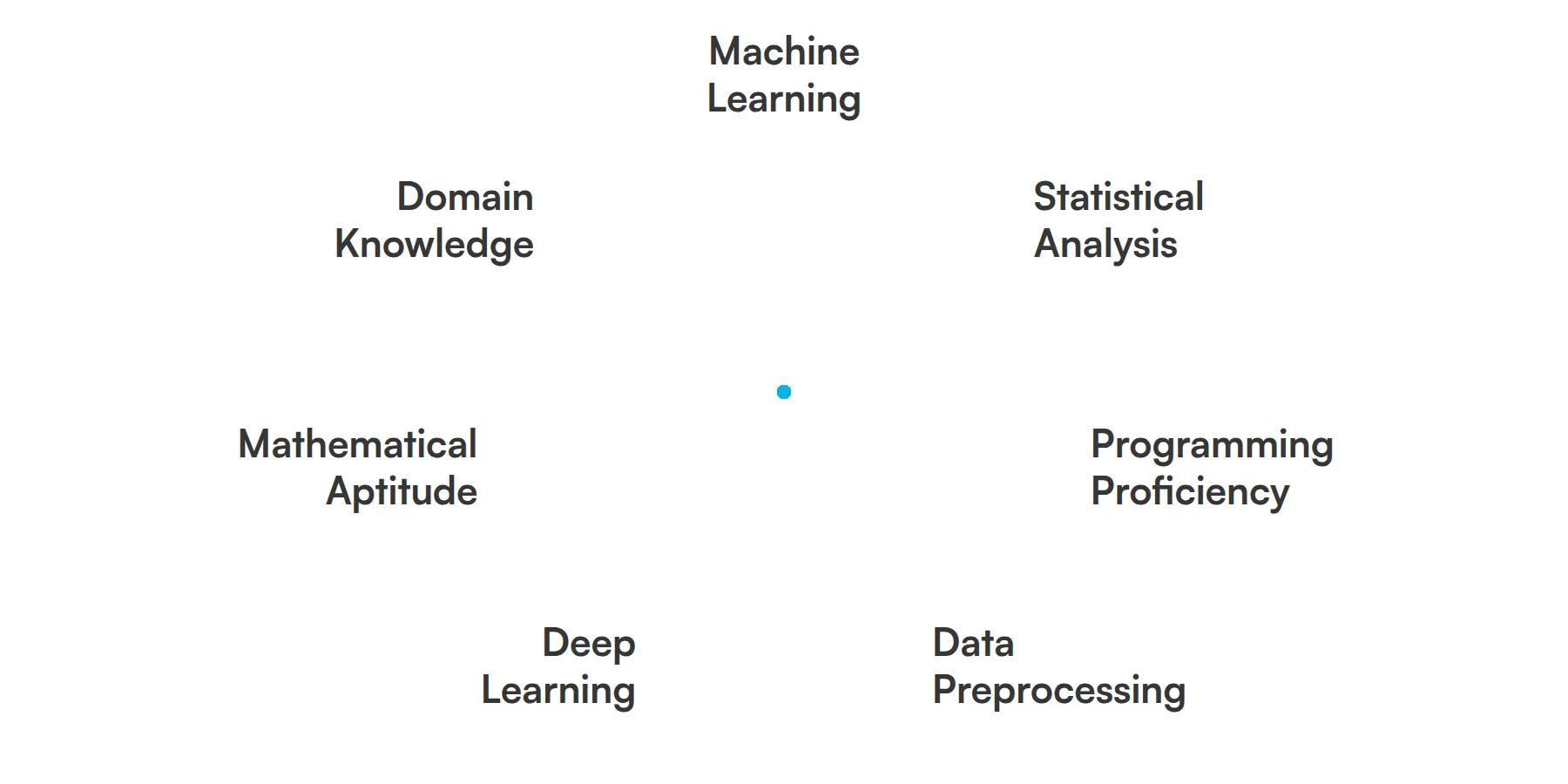
Machine Learning
Machine learning forms the backbone of AI research. As an AI Research Scientist, one must have a deep understanding of algorithms and models such as supervised and unsupervised learning, reinforcement learning, and neural networks to develop and improve AI systems. This knowledge enables effective creation of models that can process data and adapt to new information, improving decision-making capabilities over time.
For more insights, check out our guide to writing a Machine Learning Engineer Job Description.
Statistical Analysis
Strong statistical skills are necessary for analyzing large datasets and extracting meaningful insights. AI Research Scientists use statistical methods to validate model performance and interpret experimental results. Mastery in statistics helps in formulating actionable conclusions from data patterns, an essential step in developing reliable AI models.
Programming Proficiency
Proficiency in programming languages such as Python, R, or Java is a must. An AI Research Scientist relies on these skills to implement algorithms, manipulate data, and create simulations. Coding expertise facilitates translating theoretical models into functioning code that can be tested and deployed in real-world scenarios.
Check out our guide for a comprehensive list of interview questions.
Data Preprocessing
Handling and preparing data for analysis is integral to AI research. Knowing how to clean, transform, and structure data allows an AI Research Scientist to ensure the accuracy and relevance of data before feeding it into models. This skill is critical for building models that are based on high-quality data inputs.
Deep Learning
Deep learning focuses on neural networks with many layers, which AI Research Scientists use to interpret and understand complex data structures. Knowledge in this area is crucial for breakthroughs in areas like computer vision and natural language processing. It involves designing and training neural networks to perform tasks beyond human capacity.
Mathematical Aptitude
A solid foundation in mathematics, particularly in areas like linear algebra, calculus, and probability, is essential. These math skills support the understanding and development of new algorithms and models. They empower an AI Research Scientist to conceptualize abstract ideas and apply them effectively in their projects.
Domain Knowledge
Understanding specific industry domains can greatly enhance AI research. Whether it's healthcare, finance, or another field, contextual knowledge allows an AI Research Scientist to tailor AI solutions to meet specific challenges and improve domain-specific outcomes by leveraging AI technologies.
8 secondary AI Research Scientist skills and traits
The best skills for AI Research Scientists include Data Visualization, Cloud Computing, Database Management, Natural Language Processing, Collaborative Tools, Problem-Solving Techniques, Ethics in AI and Project Management.
Let’s dive into the details by examining the 8 secondary skills of a AI Research Scientist.
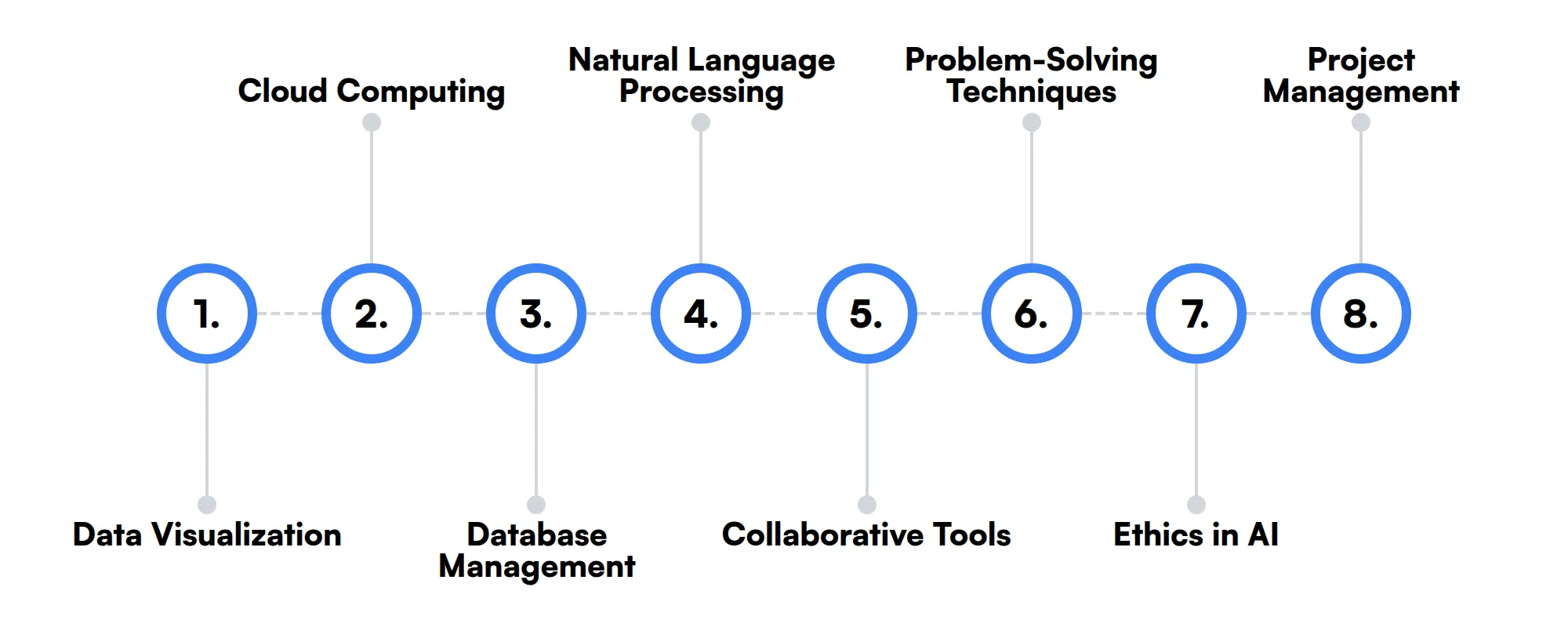
Data Visualization
Visualizing data effectively helps in communicating insights and results. It is useful for presenting complex data and models in an easily understandable manner to stakeholders and team members.
Cloud Computing
Familiarity with cloud platforms such as AWS, Azure, or Google Cloud is beneficial for AI Research Scientists. It enables the efficient processing of large datasets and model training by leveraging scalable computing resources.
Database Management
Skills in managing and querying databases like SQL or NoSQL are important for handling large volumes of data. An AI Research Scientist may need to access and manipulate data stored in complex databases as part of their research.
Natural Language Processing
For projects involving language data, proficiency in NLP is useful. It involves enabling machines to understand and generate human language, which can aid in developing chatbots and translating tools.
Collaborative Tools
Knowledge in using collaboration tools such as Git for version control and team coordination is helpful. This ensures efficient teamwork and code management in AI projects.
Problem-Solving Techniques
Skilled problem-solving aids in diagnosing and resolving issues that arise in AI research processes. Creative thinking and structured approaches to troubleshooting enhance the effectiveness of an AI Research Scientist.
Ethics in AI
Understanding the ethical implications of AI systems is becoming increasingly important. AI Research Scientists should be aware of issues like bias, fairness, and privacy to ensure responsible AI development and deployment.
Project Management
Basic project management skills help in planning, executing, and closing AI research projects. An AI Research Scientist may need to organize tasks, manage resources, and coordinate with team members to accomplish research goals.
How to assess AI Research Scientist skills and traits
Assessing the capabilities of AI Research Scientists requires a keen understanding of the diverse skills they must possess. These scientists work at the intersection of technology and data, employing machine learning, statistical analysis, programming, data preprocessing, and deep learning to turn complex datasets into actionable insights. Evaluating these skills is not just about checking off a list but understanding how these abilities translate into solving real-world problems.
While resumes can provide a summary of educational background and certifications, they often lack a clear indication of a candidate's hands-on proficiency and adaptability to novel challenges. This is where skills-based assessments step in. By leveraging tools like Adaface on-the-job skill tests, you can effectively measure a candidate's competencies and reduce screening time by 85%. These assessments are tailored to reveal how well prospective candidates can model and analyze data in a manner that is both innovative and applicable to relevant industry domains.
Let’s look at how to assess AI Research Scientist skills with these 6 talent assessments.
Machine Learning in AWS Online Test
Our Machine Learning in AWS Online Test evaluates a candidate's proficiency in applying machine learning techniques within the Amazon Web Services (AWS) environment.
This test assesses their understanding of machine learning concepts, data analysis, programming with Python, and using AWS services like Kubernetes and AWS DevOps.
Successful candidates demonstrate a deep understanding of data science and AWS environments, showcasing their ability to design and implement machine learning solutions effectively.
Statistics Test
Our Statistics Test evaluates a candidate's understanding and proficiency in statistical methods and analysis.
This test assesses knowledge in statistical fundamentals, inference techniques, data sampling, and regression analysis to gauge a candidate's quantitative aptitude.
High-scoring candidates excel in probability and non-parametric statistics, indicating strong numerical reasoning and data interpretation skills.
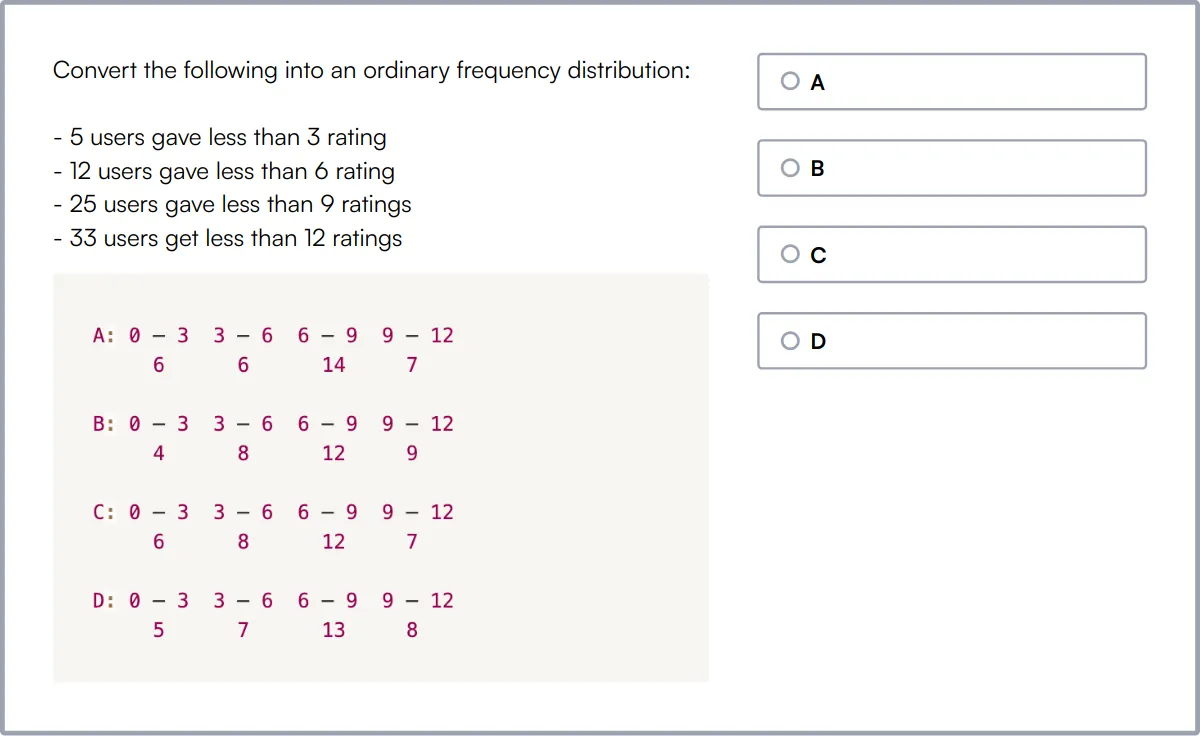
Basic Computer Skills Test
Our Basic Computer Skills Test evaluates fundamental computer skills essential for data-related roles.
The test covers data entry, Excel proficiency, and basic system administration skills.
Candidates with strong typing and Linux command-line abilities often demonstrate effective shell scripting and computer programming aptitude.
Data Wrangling Test
Our Data Wrangling Test evaluates a candidate's skills in organizing and transforming raw data into a structured format.
This test assesses data extraction, parsing, and quality assessment skills, crucial for creating reliable datasets for analysis.
Top candidates demonstrate excellence in data modeling and validation, indicating an ability to interpret and integrate complex datasets effectively.
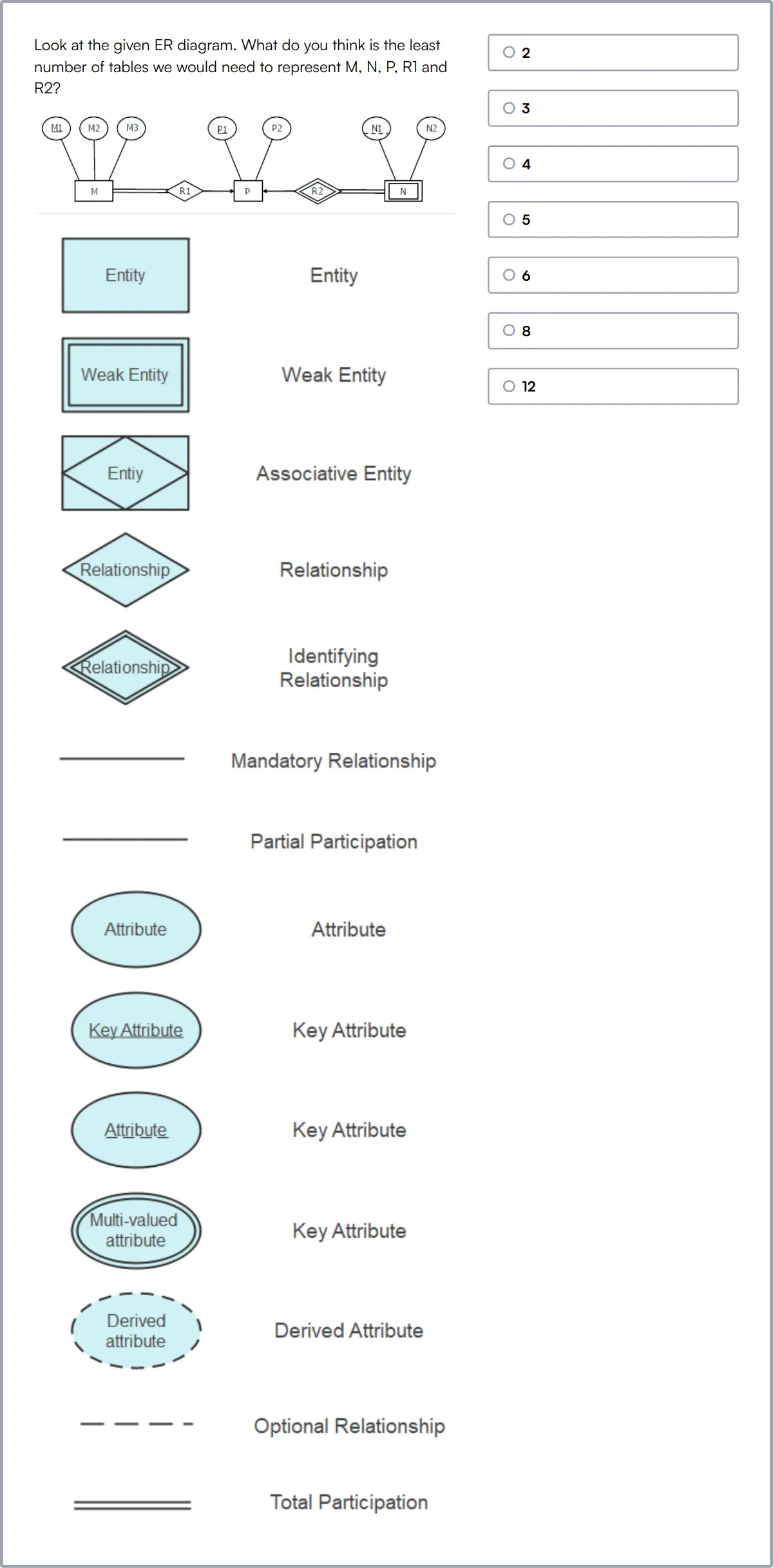
Deep Learning Online Test
Our Deep Learning Online Test evaluates a candidate's understanding of core deep learning concepts and their application to real-world scenarios.
The test focuses on neural networks, backpropagation, and advanced techniques like convolutional and recurrent neural networks. It also evaluates skills in computer vision and natural language processing.
Candidates with high scores typically excel in generative adversarial networks and demonstrate a strong grasp of data processing pipelines.
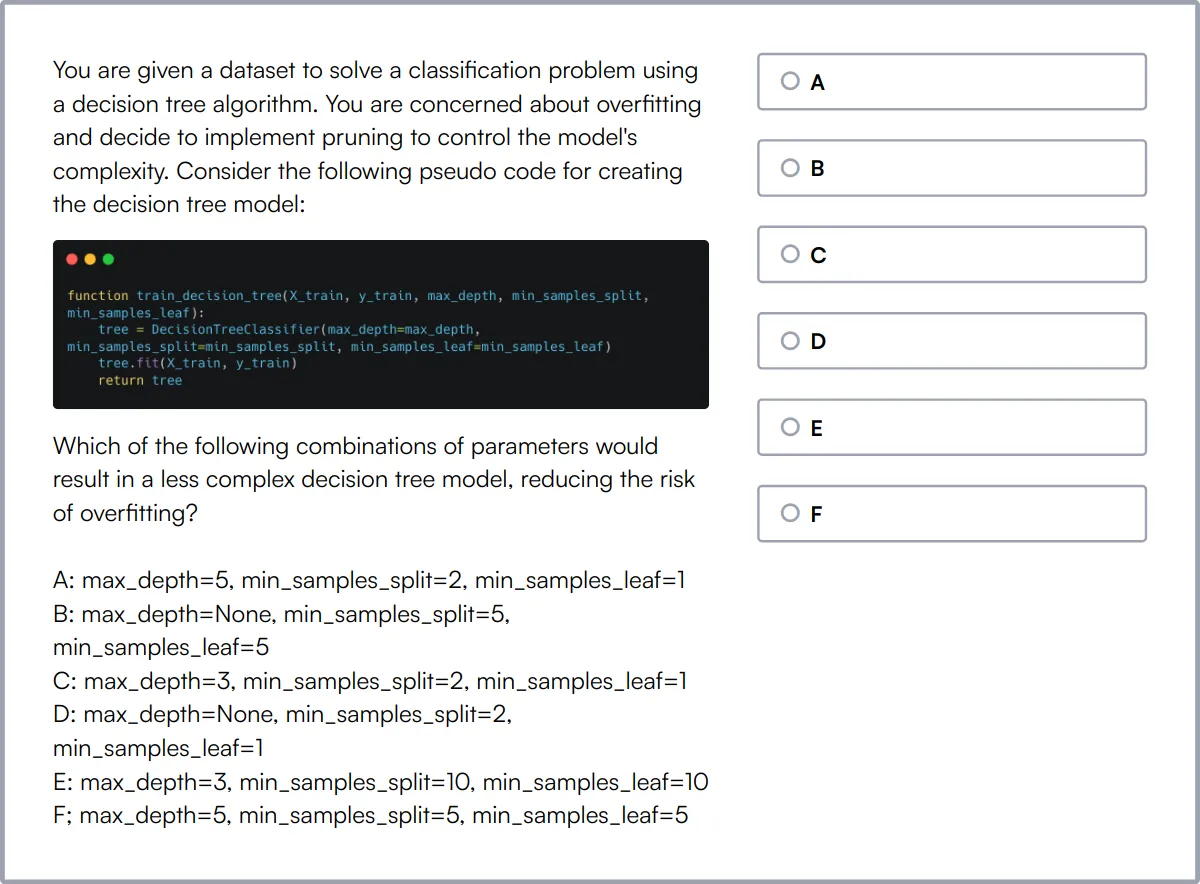
Numerical Reasoning Test
Our Numerical Reasoning Test assesses a candidate's ability to understand and interpret numerical data.
The test challenges knowledge of ratios, percentages, tables and graphs, and currency conversions to solve complex problems.
Successful candidates show strong abilities in data visualization and interpreting profit and loss scenarios, key for roles involving data interpretation.
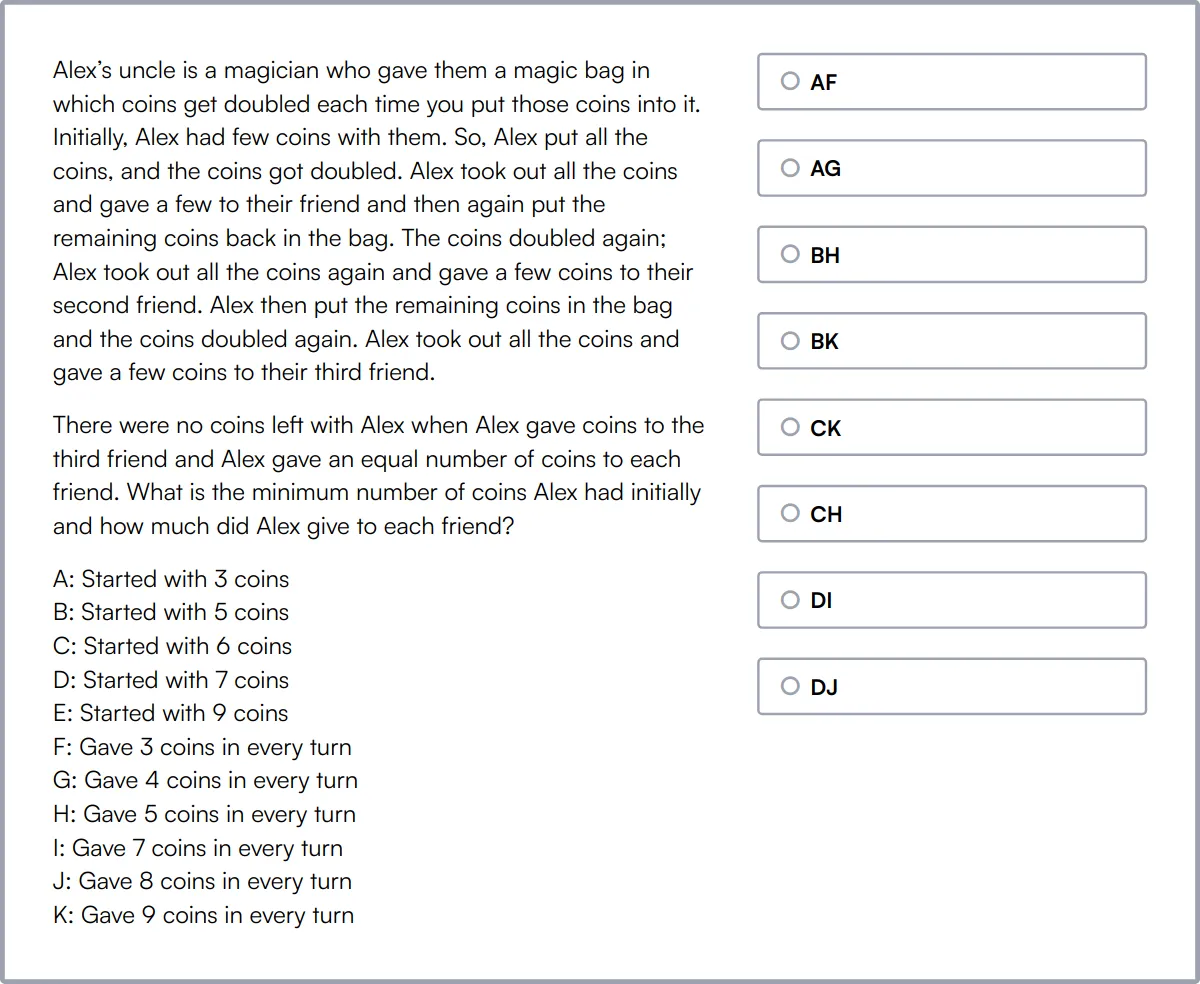
Summary: The 7 key AI Research Scientist skills and how to test for them
| AI Research Scientist skill | How to assess them |
|---|---|
| 1. Machine Learning | Evaluate ability to develop models and algorithms from data. |
| 2. Statistical Analysis | Assess proficiency in analyzing data patterns and distributions. |
| 3. Programming Proficiency | Check coding skills in Python, R, or other relevant languages. |
| 4. Data Preprocessing | Gauge skill in cleaning, transforming, and preparing raw data. |
| 5. Deep Learning | Examine knowledge of neural networks and training deep models. |
| 6. Mathematical Aptitude | Measure understanding of linear algebra, calculus, and probability. |
| 7. Domain Knowledge | Verify expertise in applying AI to specific industry contexts. |
AI Model Designer Test
AI Research Scientist skills FAQs
How do you assess machine learning skills in an AI Research Scientist?
Review their understanding of algorithms like decision trees and SVMs. Ask for examples of past projects or papers where they applied these techniques. Test their ability to experiment and optimize models using real datasets.
What programming languages should AI Research Scientists be proficient in?
Proficiency in Python is essential due to its rich library ecosystem. Knowledge of languages like R, Java, or C++ is also beneficial, especially for specific tasks or framework requirements.
How can a candidate's understanding of deep learning be evaluated?
Inquire about their knowledge of neural networks, CNNs, and RNNs. Ask them to describe projects involving frameworks like TensorFlow or PyTorch, assessing their experience in implementing deep learning models.
What is the significance of mathematical aptitude in AI research?
Mathematics is the backbone of AI, with linear algebra, calculus, and probability being especially important. Evaluate their ability to develop algorithms and perform statistical analysis through theoretical questions or problem-solving tasks.
Why is domain knowledge important for an AI Research Scientist?
Domain knowledge allows for more relevant and impactful AI solutions. Assess their understanding of the specific industry through past projects, publications, and their ability to discuss industry-specific problems.
How do collaborative tools enhance the workflow of AI Research Scientists?
Collaborative tools like Git, Jupyter Notebooks, and cloud platforms foster team cooperation and knowledge sharing. Evaluate their experience with these tools by discussing past collaborative projects.
What ethical considerations are important in AI projects?
Ethics in AI involves fairness, transparency, and accountability. Discuss scenarios where bias and privacy were key challenges, evaluating their approach to these ethical issues in prior work.
Why is project management important for AI Research Scientists?
Project management ensures timely delivery and resource management. Query about their experience with project planning, time management, and tools like Agile methodologies to gauge their competence.

40 min skill tests.
No trick questions.
Accurate shortlisting.
We make it easy for you to find the best candidates in your pipeline with a 40 min skills test.
Try for freeRelated posts
Free resources



